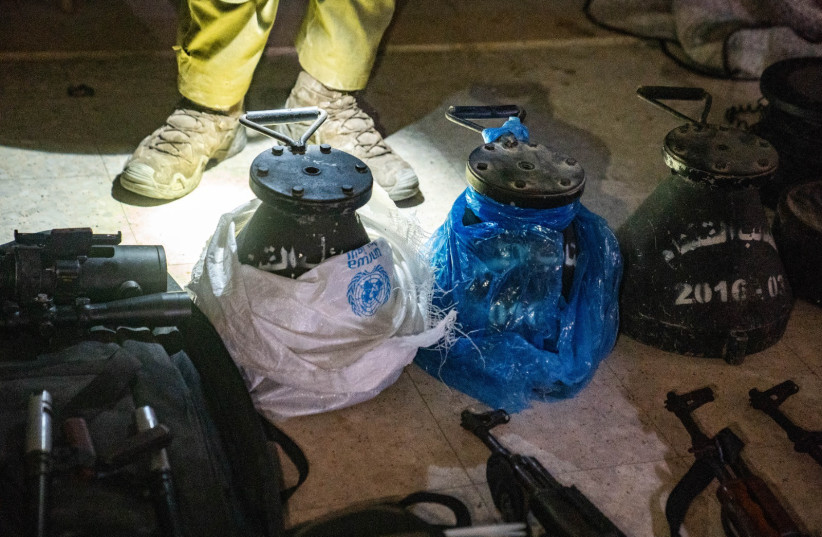While Israel is progressing in its goal to dismantle Hamas’s fighting capabilities, it is not doing enough to dismantle the terrorist organization’s civilian wing, National Unity MK Ze’ev Elkin, chairman of the Knesset’s Subcommittee for Foreign Policy and Public Diplomacy and a member of the Foreign Affairs and Defense Committee (FADC), said in an interview on Thursday.
According to Elkin, one of the war’s goals, as formulated by the National Security Cabinet (NSC), is not only to defeat Hamas militarily, but also to take apart its capability to rule Gaza. However, if Israel does not focus on removing civil governing officials from their positions, Hamas will continue de-facto to control the populace and eventually will seek to rebuild its armed wing, Elkin argues.
UN facilities facilitating Hamas
This civilian wing includes government and other officials, but also members of the United Nations Relief and Works Agency (UNRWA), Elkin argues.
He gives the example of shelters in the Strip, many of which are located in UNRWA-run schools. Although officially under the auspices of UNWRA, many of these shelters are run by Hamas, Elkin claims. These Hamas members have complete control over the food, water, and services in the shelters, and therefore civilian dependence on Hamas has actually grown, not shrunk, he says.
Asked how Israel should solve this problem, Elkin said that Israeli troops should enter the shelters themselves and remove all Hamas members from administrative positions – and should have done so in northern Gaza before most of its troops there were removed.

The IDF does not necessarily initiate such moves since its focus is military, and the dismantling of Hamas’s civilian arm must therefore be a focus of Israel’s political echelon. Elkin believes that Israel must cease its cooperation with UNRWA, and, as a member of the FADC, he is pushing for this.
“UNRWA’s role today is to eternalize the problem of Palestinian refugees and not solve it,” he says. Teachers in UNRWA’s Gaza school system expressed support for the October 7 massacre, and some even took pride in former students who participated in it, Elkin claims. He adds that Israel should lead a campaign against UNRWA in the UN General Assembly, but more importantly, campaign in the states that support it financially – chiefly among them the US.
“It cannot be that a member of Hamas, a terrorist organization, holds a position in UNRWA,” Elkin says.
He links the issue of insufficient treatment of Hamas’s civilian wing to what he claims is the cabinet’s “mistaken direction” of removing troops from areas that have not been completely conquered, such as the refugee camps in the center of the Gaza Strip.
Not only has Israel not completely destroyed the Hamas battalions in these camps, its removal of troops is also detrimental to the effort to release the 136 hostages in Hamas captivity, he argues. Senior Hamas leader Yahya Sinwar has no reason to become more flexible if time is on his side, since he can simply wait until Israel eventually retreats. Therefore, retreating not only hampers Israel’s military aims, it also hampers Israel’s ability to apply pressure on Sinwar that would eventually lead to a deal to release the hostages, he argues.
This leads to the question of who will rule Gaza the “day after” the war. Elkin opines that the term “day after” is misleading – Israel cannot wait until the day after the war, since if there is no alternative, Hamas will by default continue to fill the administrative vacuum. Rather, in addition to weakening Hamas’s civilian wing, Israel should already be attempting to bring forward an alternative.
Elkin disagrees with the US administration’s aim to install in Gaza a “renewed” Palestinian Authority. The PA should not be involved in governing Gaza, since it is too weak and too radicalized, Elkin argues. The PA does not enjoy enough support among Palestinians in the West Bank, and is not strong enough to combat Hamas in the West Bank itself and all the more so in Gaza. Its schools continue to preach hate of Israel, and it continues to pay salaries to Palestinian terrorists, including those that participated in the October 7 massacre, Elkin argues.
He agrees that the PA eventually could change, but opines that Israel does not have the luxury to wait. Elkin says that he has no clear answer, but that this is not a reason not to work towards one – and that this question cannot be ignored.
Elkin’s criticism of the government also includes its proposal for a renewed 2024 budget, which passed a cabinet vote on Monday and is set to begin making its way through Israel’s legislative process.
Elkin lists a number of problems. First, the proposed debt of 6.6% is too high and irresponsible – and Israel could rather have funded some of the war effort by cutting political funds or closing unnecessary ministries. In addition, the budget does not include growth engines, he says.
“When the economy is in distress because of a war, it isn’t enough just to make budget cuts – the government needs to invest in growth engines in order to help the economy continue to grow after the war,” Elkin says. These include structural reform, cutting bureaucracy of investment in infrastructure.
But this will not lead to National Unity leaving the government, Elkin says. “We were never fans of this government … but we joined because the most important thing for Israel right now is to defeat Hamas – and not doing so will strategically endanger Israel’s future.”
“We joined and said we will be there until we win the war – and therefore we are there even when we have sharp disagreements with some of its actions,” Elkin concludes.
